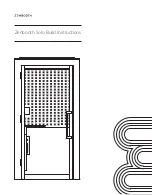
Figure 34
1.
Oil dipstick
2.
Filler tube
5. Unscrew the oil dipstick and wipe the end clean
6. Slide the oil dipstick fully into the filler tube, but do
not thread onto tube (Figure 34).
7. Pull the dipstick out and look at the end. If the oil
level is low, slowly pour only enough oil into the filler
tube to raise the level to the Full mark.
Important:
Do not overfill the crankcase with
oil and run the engine; engine damage can
result.
Changing the Oil
1. Start the engine and let it run five minutes. This
warms the oil so it drains better.
2. Park the machine so that the drain side is slightly
lower than the opposite side to ensure that the oil
drains completely.
3. Lower the boom and set the parking brake.
4. Stop the engine, remove the key, and wait for all
moving parts to stop before leaving the operating
position.
5. Place a pan below the drain hose. Rotate the oil drain
valve to allow oil to drain (Figure 35).
Figure 35
1.
Oil drain valve
2.
Oil drain hose
6. When oil has drained completely, close the drain
valve.
7. Dispose of the used oil at a recycling center
8. Slowly pour approximately 80% of the specified oil
into the filler tube (Figure 34).
9. Check the oil level; refer to Checking the Engine Oil
Level.
10. Slowly add the additional oil to bring it to the Full
mark.
Changing the Oil Filter
1. Drain the oil from the engine; refer to Changing the
Engine Oil.
2. Remove the old filter (Figure 36).
Figure 36
1.
Oil filter
2.
Adapter
3. Apply a thin coat of new oil to the rubber gasket on
the replacement filter (Figure 36).
4. Install the replacement oil filter to the filter adapter,
turn the oil filter clockwise until the rubber gasket
contacts the filter adapter, then tighten the filter an
additional 3/4 turn (Figure 36).
26
















































